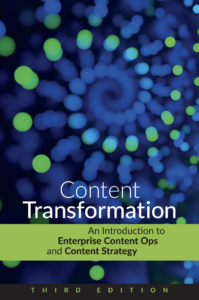The convergence of information science and tech comm
Until I started working at Scriptorium, my educational and work background was in information and library science.
I have worked at the circulation and reference desks in academic libraries at both the community college and four-year university level. Over the last few months, amazingly enough, so much of what I’ve learned from past work experience works hand in hand with tech comm.
People ask me what information science is, and I usually respond jokingly with “computer science without the math.” However, it is obviously much more than that. It covers web design, database design and management, information security, information search and retrieval, and the list goes on.
 Library science is also an extremely broad field that ranges from cataloging books to collection development to reference and instruction services. Today’s libraries are at the cutting edge of technology, believe it or not. They work with web 2.0 tools, social media, and the latest gadgets.
Library science is also an extremely broad field that ranges from cataloging books to collection development to reference and instruction services. Today’s libraries are at the cutting edge of technology, believe it or not. They work with web 2.0 tools, social media, and the latest gadgets.
There are many different types of libraries, but the major types are academic, public, school library media centers, and corporate.
The biggest misconception of what a librarian does can be summed up in this statement:
You mean you have to have a master’s to check out books and shush people???
Now how do these disciplines work with tech comm? Well, basically, tech comm is the flip side of the information life cycle from information and library science. Technical communicators create the containers of information, whether it is a PDF, HTML, e-book, or some other form of electronic content.
Librarians and information professionals are responsible for searching and retrieving content from the resource that technical communicators create. They have to search knowledge bases, navigate websites, and access databases.
Something to think about: Not everyone has the level of technology expertise that we do. That is why it is important to structure content in a way that makes it simple and easy to understand, and navigate. This makes our lives as a middleman easier and helps the end users gain access to top quality information. [Ed. Note: Did you know that a middleman was originally a “maker of girdles”?]
You’d be surprised at how many people don’t automatically know how to search to get the answers they actually need. Understandable really, because Google is full of junky websites trying to outrank each other.
I still have my toes in the library world moonlighting as a reference librarian for NCKnows, a statewide chat based reference service. As I get deeper into the tech comm industry in my day job, the questions I answer from NCKnows serve as a constant reminder to create content that is intuitive and easy to use.



Larry Kunz
Good, thoughtful article, Holly. Thanks for sharing your experiences.
I don’t see tech comm as the flip side to information and library science, though. Not any more. Rather, I see them as two disciplines that are converging. As the whole paradigm of publishing changes, the technical communicator must understand the principles that you’ve already mastered: how users look for information, how to organize content, how to make content searchable, and so forth.
Where we technical communicators used to strike an authoritarian pose, creating content that was viewed as gospel, now we take the role of a guide. To use your words: we search and retrieve content; we search knowledge bases, navigate websites, and access databases. Then we take our users by the arm and help them find the information they need. About the only thing we don’t get to do (yet) is shush people.
Rhonda
Thanks for sharing, Holly. I was a teacher-librarian in my previous career (18 years), then segued into library software support and training and ultimately documentation (library software user and training manuals, and online Help), then on to my next career as a technical communicator.
Like you, I see a lot of similarities in the two fields, and have found that my librarianship/information management skills have really helped me in my tech comm life.
Simplistically, I see librarianship as taking a macro view of information and tech comm as taking a micro view. With tech comm we tend to work on a small number of projects, trying to make the information we provide as user friendly as possible and as easy to search, navigate, and understand as possible. With librarianship, we help the reader navigate all the possible sources of information that can help them in their quest to find an answer.
In both professions we are either creating or consuming content, and creating or using guideposts to help us and/or our reader/user in that task — indexes, searches, breadcrumbs and other navigational devices, semantic structures, white space, captions/callouts, cross-references/links, sidebars, cataloging (aka metadata) etc. etc.
Of course, being in a high school library meant that ‘shushing’ people was out of the question! We wanted them to use the library and its resources (physical and human) and if they made some noise doing that, then that was fine with me 😉
Holly
Thanks for your responses! Electronic information is bridging the gap between tech comm and information science.
It is funny. When I worked at the reference desk I usually had to ask people to speak up because they were speaking so softly. I guess they were afraid of being shushed.